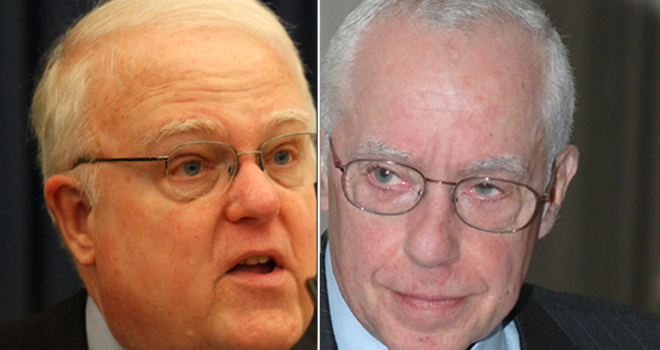The U.S. Chamber of Commerce thinks a law that prohibits American businesses from paying bribes to foreign government officials is hurting U.S. companies, and Republicans in the House agree. But don’t accuse them of being pro-bribery.
“Nobody here is in favor of bribery,” said Rep. Jim Sensenbrenner (R-WI) at a Judiciary Committee hearing Tuesday examining the 1977 Foreign Corrupt Practices Act (FCPA). But Sensenbrenner and House Republicans made clear they intend to change the law as it currently stands.
Sensenbrenner called the FCPA statute vague and said it was too open to the interpretation of the Justice Department, arguing that the feds could even apply the law to paying for cab rides for their overseas workers if they wanted. But a Justice Department representative pointed out that all the panelists advocating for reform couldn’t point out one example of when they believed the feds had overreached by prosecuting over a cup of coffee or taxi ride and touted recent cases involving bribery with a Ferrari, a yacht and a $170,000 payment toward a credit card bill.
Sensenbrenner argued that companies “lack guidance on how expensive a gift must be to be considered a bribe” and said prosecutions should be more effective, fair and predictable. He argued that the way the law could be enforced could “put at a significant disadvantage to our foreign competitors.”
Former Attorney General Michael Mukasey, who has been lobbying to change the statute on behalf of the U.S. Chamber of Commerce’s Institute for Legal Reform, testified that the FCPA has “substantial” merits but proposed six amendments he said would improve the law.
Mukasey argued that the FCPA was a “Catch-22” because under the law businesses could still be punished even if they had a robust compliance system in place to prevent illegal bribes and voluntarily disclosed violations to the government. He said there could be a “perverse incentive not to be too aggressive lest wrongdoing be discovered.”
Just as companies who meet certain standards can’t be held reliable under Title VII of Civil Rights Act if a rogue employee discriminates based on race, companies that have an anti-bribery compliance system in place should be able to use a compliance defense, Mukasey argued. He said dozens to hundreds of complaints are resolved through that provision of the Civil Rights Act each year.
“I think the lesson here is that having a compliance defense actually diminishes the overall instances of discrimination because it encourages employers to have robust systems of compliance,” Mukasey said.
He argued that right now the law treats bribery more harshly than discrimination.
“Otherwise it would look like the interests that are served by the FCPA are given more weight in a statutory scheme than the interests served by the civil rights laws, which is certainly not the case,” Mukasey said.
But Greg Andres, who testified on behalf of the Justice Department, said allowing for a compliance defense would create a loophole for companies to beat foreign bribery rap based on a “novel and somewhat risky approach.”
Mukasey also advocated for Congress to clarify the meaning of a “foreign official” under the law, arguing that that definition could include anyone in countries where businesses were state-owned.
A representative of an organization for criminal defense lawyers also argued that the feds had too much prosecutorial discretion under the law.
“Because there has been so little judicial scrutiny of FCPA enforcement theories, right now the FCPA essentially means whatever the Department of Justice (DOJ) and Securities and Exchange Commission (SEC) say it means,” Shana-Tara Regon, Director of White Collar Crime Policy for the National Association of Criminal Defense Lawyers (NACDL), said in a statement.
“Commercial corruption is a very real, very insidious problem in the global marketplace and advocating for reform in the FCPA context is absolutely not advocating for commercial bribery,” Regon said.
The U.S. Chamber of Commerce held a briefing for congressional staffers on the FCPA ahead of the hearing, as Christopher M. Matthews reported for MainJustice.com.
[Ed. note: this story has been updated.]









